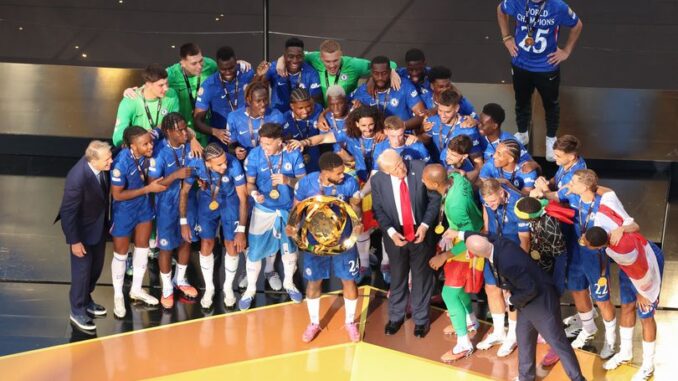
Cole Palmer Reacts After Donald Trump Overshadows Chelsea’s Club World Cup Triumph
Chelsea’s historic 3–0 victory over Paris Saint‑Germain in the inaugural 32‑team FIFA Club World Cup final on July 13, 2025, will long be remembered for Cole Palmer’s brilliance. Two sublime goals and a cheeky assist earned him the Golden Ball MVP. Yet, amid the silverware and glory, one image dominated headlines: U.S. President Donald Trump lingering on stage during the trophy presentation, casting an unexpected shadow over Chelsea’s moment of triumph.
A Spectacular Night Turns Uneasy
At MetLife Stadium in East Rutherford, New Jersey, over 81,000 fervent spectators witnessed a dominant performance from the Blues, capped off by Palmer’s potent opening salvo. As captain Reece James lifted the trophy, Donald Trump stood cheek by jowl with the Chelsea stars, applauding, clapping—and refusing to quickly leave the podium (TIME).
Chelsea legend Palmer, basking in personal and team glory, was visibly caught off guard. He admitted afterward:
“I knew he was going to be here, but I didn’t know he was going to be on the stand when we lifted the trophy… I was a bit confused.” (TIME)
That candid admission fuelled a meme fest online and ignited criticism about the former president’s intrusion into a sporting moment (The Times of India).
Confusion on the Podium
The awkwardness extended beyond Palmer. Captain Reece James had reportedly anticipated that Trump—tasked with presenting the trophy—would promptly exit afterward. Instead, he lingered, prompting James to later joke, “I thought he was going to leave, but he wanted to stay” (TIME). Even FIFA President Gianni Infantino appeared to struggle to nudge Trump aside so that the players could have their celebratory moment (TIME).
NBC’s coverage captured Palmer visibly leaping in mid‑celebration—only to realize the U.S. President had stepped between him and goalkeeper Robert Sánchez (NBC New York). It was a surreal visual: a star athlete confronting the surreal reality of sharing the podium with a political figure who hadn’t planned to leave.
Not Just Distraction—A Symbolic Clash
Trump’s presence was no accident; it was a strategic play. His attendance emphasized America’s increasing profile within FIFA and its upcoming role as co‑host of the 2026 World Cup (TIME). However, the reception was uneven. Fans booed him several times—during the national anthem, his appearance on stadium screens, and the trophy presentation (TIME). The boos spoke volumes: this was more than discomfort, it was a backlash.
Yet Trump defended his position. He hailed the event as “tremendous,” praised soccer’s rising profile in the U.S., and even suggested he might one day rename the sport “football” on American soil (TIME). Meanwhile, Infantino touted the ceremony, with Trump included, as part of FIFA’s larger strategy—but observers suggested the interference diminished the players’ moment.
Palmer’s Performance: A Statement Amid the Noise
Despite the distraction, Palmer refused to let anything derail his performance. He struck twice within eight minutes in a brutal first-half blitz, then locked down the MVP award with a sharp assist to Joao Pedro (TIME, Sky Sports). Sky Sports praised his clinical execution and Maresca’s game plan: “The gaffer put a great gameplan out. He knew where the space was going to be. I just had to repay him and score some goals.” (Sky Sports)
Palmer’s consistency in big games was no coincidence. He bagged two goals in this final—almost matching a year’s worth of output in just 90 minutes . A rising star, he entered the match with 18 goals for the season, adding weight to his claim as one of England’s best young talents .
After receiving the Golden Ball, Palmer also reflected on how Chelsea had silenced doubters:
“It’s a great feeling – even better because everyone doubted us before the game… I like finals. It happened again.” (Sky Sports)
The Broader Conversation: Sport, Power, and Stage
This episode has sparked a complex debate: should political figures participate in sports celebrations? Trump’s appearance overshadowed a pure moment of athletic accomplishment—and riled fans who didn’t want the spotlight shared (TIME).
Observers noted that his lingering presence suggested a hunger for personal photo-ops. Trump had clapped, been featured prominently on the jumbotron, and even took home a medal from Infantino—behavior described as “upstaging” the players (TIME).
But to Trump and FIFA, this symbolized soccer’s American moment. With the World Cup coming to North America in 2026, high-profile representation—especially from someone as controversial as Trump—was part of the calculus .
What Palmer’s Reaction Signals
Palmer’s words were striking in their mix of respect and surprise. He noted he was told Trump would be present, but admitted he had not anticipated him sharing the podium when lifting the trophy (The National). That brief statement perfectly encapsulated the moment: confusion, midfield between prestige and protest, awe and awkwardness.
His straight-talking post-match interview, praising Maresca’s tactical decisions while expressing bafflement about the ceremony, became the story. It wasn’t political—it was personal and honest. Palmer didn’t cower under scrutiny; he put performance at the forefront and let his play speak for him.
Moving On—But What’s Next?
Chelsea’s triumph was unquestionable: they claimed not just the trophy, but also cemented the success of Maresca’s youth-heavy, tactically flexible project. The tournament brought more than four trophies this season—it brought relevance, growing revenue, and a statement of global intent .
But the Trump incident has left lingering questions: should sports be used as stages for political gain? Will future players negotiate terms to prevent political figures from overshadowing them? Clubs, fans, and governing bodies are already rethinking event protocols to preserve the purity of achievement while allowing dignitaries to play their ceremonial roles.
For Palmer, though, the night was about football. In his Golden Ball acceptance and candid commentary, he underlined his focus on sport, letting performance define the narrative. If there’s one thing he made clear amid the confusion, it’s that on football’s grandest stages, the ball should always come before the politics.
Leave a Reply